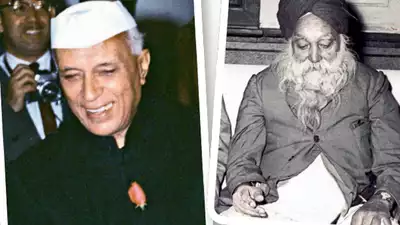Explore the Tara Singh-Nehru Pact of 1959 aimed at addressing Sikh concerns over religious interference and the push for Punjabi Suba. Learn more today.
ANANDPUR SAHIB RESOLUTION, a frequently invoked document of modern Sikhism pronouncing its religious rule as well as its political goal. After having enjoyed power under chief ministers, Gurnam Singh and Parkash Singh Badal in the Punjab, newly demarcated in 1966, Sikhs as represented by their premier political party, the Shiromani Akali Dal, were able to capture only one seat at the elections to Indian Parliament (1971) from among the 13 which were Punjab`s portion. In the Punjab Assembly elections which took place in March 1972 their tally was a mere 24 seats out of a total of 117, and the Punjab Government passed into the hands of the Congress Party, with Giani Zail Singh (later, President of India) as chief minister.
DARBARA SINGH, BHAI (d. 1921), still in his teens when he fell a martyr at Nankana Sahib in 1921, was the son of Bhai Kehar Singh and Bibi Ratan Kaur. His father was serving in the Indian army as a havildar (sergeant) and he was born at a cantonment station. His mother died when he was a bare three weeks old, and he was brought up by his grandmother. His father originally belonged to Jarg village, then in the princely state of Patiala, but some time after his retirement in 1908 he migrated to Chakk No. 85 Dalla Chanda Singh in a newly developed canal district.
Discover the historical significance of 'jatha' in Sikh tradition, representing volunteer bands skilled in guerrilla warfare during 18th-century conflicts.
Discover how 'morcha' shaped Indian politics from Sikh reforms to modern movements. Learn about its pivotal role in peaceful resistance and political fronts.
Discover the inspiring journey of Sadhu Singh Bhaura, Jathedar of Sri Akal Takhat, a key figure in Sikh history who led religious reforms and social initiatives.
Discover Tara Singh's transformational journey from Nanak Chand's early life in Rawalpindi to his pivotal role in Sikh politics and education.
ANDREWS, CHARLES FREER (1871-1940). Anglican missionary, scholar and educationist, was born to John Edwin Andrews on 12 February 1871 in NewcastleonTyne in Great Britain. His father was a minister of the Evangelical Anglican Church. Andrews grew up in an intense and emotional religious environment. A nearly fatal attack of rheumatic fever in childhood drew him to his mother with an intense affection and her love created in his mind the first conscious thoughts of God and Christ, and by the time he entered Cambridge, at the age of 19, he had already had "a wonderful conversion of my heart to God." In 1893, Andrews graduated first class in Classics and Theology from Pembroke College, Cambridge.
DHANNA SINGH (1888-1923). a Babar revolutiortary, was born at the village of Bahibalpur, in Hoshiarpur district. His father, Indar Singh, could barely afford to send him to the village primary school where Dhanna Singh learnt to read and write in Punjabi and Urdu. Early in his youth he was converted to radical politics by Kararn Singh, of Daulatpur, leader of the Chakravarti Jatha, and helped organize the Jathas major divans at Mahalpur (March 1921) and at Kukkar Muzara (October 1921). The Chakravarti Jathas of Kishan Singh Gargajj and Karam Singh merging together made up plans at a meeting at Jassoval on 25 December 1922 to maim, plunder or murder informers and helpers of the British government.
Explore Kartar Singh's legacy as a prominent Akali leader and strategist who shaped Sikh politics in the 40s and 50s, leaving an indelible mark in history.








